Senior Cleric Claims Religion In Iran Weak, 50,000 Mosques Closed
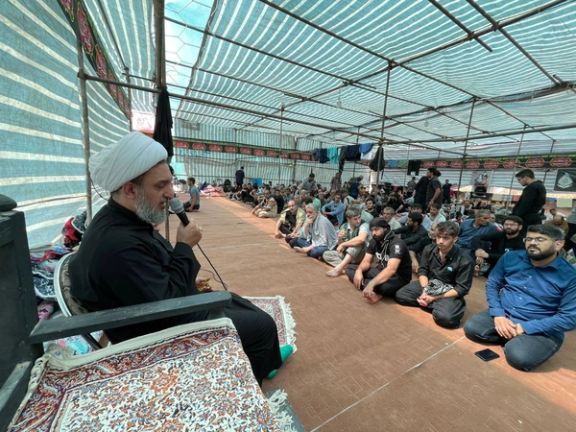
A senior Iranian cleric says around 50,000 of Iran's 75,000 mosques are closed, showing the declining numbers of Iranians attending.

A senior Iranian cleric says around 50,000 of Iran's 75,000 mosques are closed, showing the declining numbers of Iranians attending.
Expressing regret over the low numbers engaged in worship, Mohammad Abolghassem Doulabi, who serves as the liaison between Ebrahim Raisi’s administration and the country’s seminaries, said on Thursday that the numbers are a "worrying admission” for a state built around the principles of Islam.
Doulabi, who is also a member of the Assembly of Experts – a deliberative body empowered to appoint the Supreme Leader – said the outcome of religion in Iran has led to people leaving religion.
Emphasizing the weakening of religiosity among society and in turn, a weakening legitimacy of a government ruling by religious diktat, he said: “When people look at the output of the religion, they decide to enter the religion or leave the religion," with reasons including “the humiliation of people in the name of religion," “falsification of religious concepts and teachings,” and “depriving people of a decent life and creating poverty in the name of religion.”
He made the remarks as growing numbers of Iranians of all ages are becoming weary of the regime's justification of Islam as the base of its brutal dictatorship, reflected by months of violent protest since September in the wake of the death in morality policy custody of Mahsa Amini, arrested for the inappropriate use of her hijab.
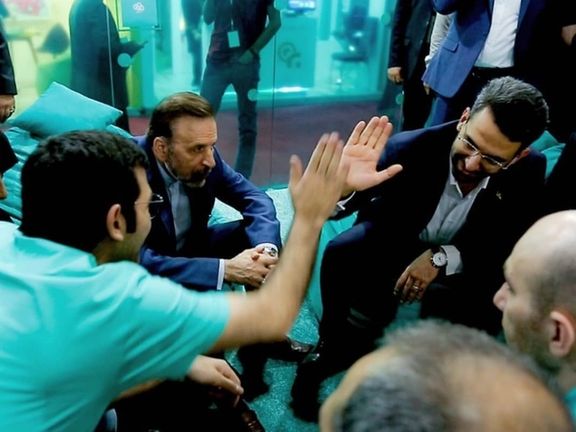
The US has sanctioned Iran-based tech firm Arvan Cloud, its co-founders, and an affiliate UAE-based company over helping the regime censor Internet in Iran.
In a statement issued on Friday, the US Department of the Treasury said Arvan Cloud has a close relationship with Iran’s intelligence services, including the Ministry of Intelligence and Security, and the company’s executives have extensive ties to senior government officials.
The EU had sanctioned the company in November.
Reiterating that unrestricted access to information is fundamental right, Under Secretary of the Treasury for Terrorism and Financial Intelligence Brian E. Nelson said, “The US is committed to holding accountable those who seek to undermine freedom of expression and suppress dissent, and to call out regimes who deny their citizens this right.”
Navyan Abr Arvan Private Limited Company, known as Arvan Cloud, and two of its founders Pouya Pirhosseinloo and Farhad Fatemi and the Dubai-based ArvanCloud Global Technologies worked with Iran’s Information and Communications Technology Ministry to develop a countrywide intranet that is being used to disconnect the Iranian people from the global Internet.
Mehdi Bahadori and Alireza Hashemi are the other co-founders and Keivan JameBozorg is the company's chairman of the board. They were not included in the US list of sanctions.
The Iranian government has regularly used Internet restrictions and the throttling of Internet speeds to suppress dissent, surveil and punish Iranians for exercising their freedom of expression and assembly both online and offline, and limit the dissemination to the international community of credible information about egregious human rights violations.
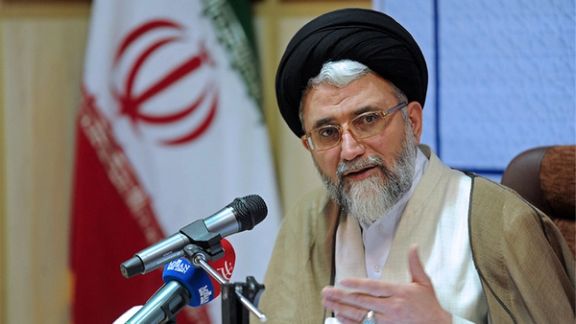
The enemy pursues regime change in Iran; Intelligence Minister Esmail Khatib told a gathering of Iranian diplomats in Tehran on Friday.
Islamic Republic official offer refer to the United States and sometimes to its allies as ‘the enemy’.
“The enemy is definitely after regime change and will not relinquish that goal. That regime change is aimed at altering the nature and essence of the Islamic Republic,” Khatib said.
The Iranian regime has blamed months of protests as a plot by foreigners and even insists that the Woman, Life, Freedom movement is a ploy by enemies to ideologically defeat the clerical political system.
Officials and senior clerics have made the issue of forced hijab a political red line and insist that if they retreat and allow women freedom in their attire, the foundations of the regime will crumble.
Ayatollah Ahmad Alamolhoda, a firebrand religious hardliner, in a speech on Friday echoed Khatib’s remarks, saying that the “enemy” encourages women to unveil because it wants to weaken and put an end to clerical rule in Iran.
Alamolhoda, a staunch supporter of Supreme Leader Ali Khamenei is the father-in-law of President Ebrahim Raisi.
Khatib also claimed that the hardliner government of president Raisi has had foreign policy success and added, “The foreign ministry will have a busy year this year.”
Iran re-established diplomatic relations with Saudi Arabia in March, but is still under Western, particularly US sanctions for persisting to expand its nuclear program.

Amid campaigning against Iran's appointment as chair of the UN Human Rights Council’s Social Forum, the Islamic Republic has gained another UN leadership position.
The regime was appointed Thursday as one of the vice-presidents of the UN General Assembly which will begin next September, drawing reactions from several members and dozens of activists. The body also appointed Iran’s envoy Heidar-Ali Balouji as the rapporteur of the Disarmament and Non-Proliferation Committee of the General Assembly and a member of the board of this committee.
The US mission in UN dissociated itself from the election and expressed its opposition to Iran's leadership throughout the UN system, saying: “Iran cannot act as an honest broker in its role as a Vice President of the General Assembly, because it has shown, time and time again, that it does not seek to enhance global peace and security, but rather works against it.”

After the election of the vice presidents of the 78th Session of the General Assembly, US Ambassador to the body, Chris Lu, said “Iran’s record, unfortunately, speaks for itself. It defies UN Security Council arms embargoes, violates the human rights of its own citizens, and exports violence and weapons, fostering insecurity and inciting violence throughout the Middle East and across the globe.”
Another US envoy, Robert Wood, referred to Iran’s persistent violations of UN Security Council resolution 2231, including pertaining to its ballistic missile program, its ongoing efforts to undermine international security, and its failure to fully cooperate with the International Atomic Energy Agency (IAEA), underlining that “a representative of Iran’s government is unfit to serve in a leadership position within this committee, even if such a position is largely ceremonial.”
Israel’s Foreign Ministry also called the decision “shameful,” saying: “In addition to murdering its own citizens, attacking innocents around the world and racing towards a nuclear weapon with the goal of wiping Israel off the map, Iran will now serve in a senior UN position.”
“This is the same country that calls for the destruction of another member state of the organization it represents,” it added, referring to the Islamic Republic's repeated call that Israel must be obliterated from the face of the Earth.
Noting that such an appointment “defies all logic and reason,” the ministry added that it is “an insult to the millions of Iranians protesting for their basic freedoms and to the justice, peace and global stability that the UN is supposed to stand for.”
The decision has caused outrage among Iranian people and activists, such as opposition figure Nazanin Boniadi, who called it “an absolute disgrace."
In May, the appointment of Iran's UN ambassador Ali Bahraini to the chair of the UN Human Rights Council 2023 Social Forum also sparked much anger and indignation. The forum to be held in Geneva on November 2 and 3 will focus on the contribution of science, technology, and innovation to the promotion of human rights including in the context of post-pandemic recovery.
After launching a petition to the UN Secretary General Antonio Guterres to cancel the appointment, UN Watch -- an independent human rights organization -- submitted a resolution to the UN to overturn the decision late in May.
Earlier in the week, a group of 26 Iranian rights groups expressed fury over the appointment, saying that according to the UN Special Rapporteur on human rights in Iran, the violence of the security forces of the Islamic Republic during the nationwide protests led to the death of hundreds, including dozens of children and women, while hundreds of other protesters were seriously injured, and thousands were arrested.
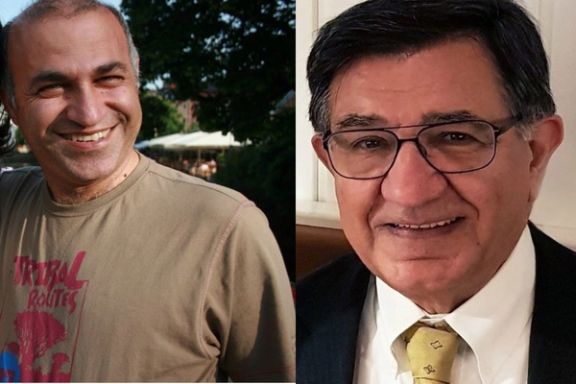
Iran has released two Austrian-Iranian hostages with reports suggesting the regime is about to free other prisoners with dual-nationality.
The Austrian Foreign Ministry said in a statement on Friday that Kamran Ghaderi and Massud Mossaheb have been freed after years of persistent diplomatic efforts. They are among unknown numbers of diplomatic hostages held by the regime.
Foreign Minister Alexander Schallenberg said: "I am very relieved that we can finally bring Kamran Ghaderi and Massud Mossaheb home after years of arduous imprisonment in Iran. They are already on their way to Austria, where their families are eagerly waiting for them.”
Ghaderi was arrested in January 2016 upon his arrival in Iran from Austria for a routine business trip. In October 2016, the Iranian judiciary sentenced him to 10 years in prison for espionage, along with the dual and foreign nationals Siamak Namazi, Baquer Namazi, and Nizar Zakka.
Mossaheb, a 73-year-old was also serving a 10-year prison term over vague national security offences. The regime arrested Mossaheb in late January of 2019 when he traveled to Iran with a delegation from MedAustron, an Austrian radiation therapy and research firm seeking to establish a center in Iran. He had worked in Iran for the International Atomic Energy Agency in 1977–78, prior to the Islamic Revolution
Reuters says a Danish national was also released but it did not release his/her name. In a statement, the Belgian government said that the Danish person was arrested in Iran in November 2022 in connection with women's rights demonstrations.
After medical tests, the three will be flown to Belgium's military airport in Melsbroek following a stop in Oman.
Schallenberg thanked his Belgian counterpart Hadja Lahbib as well as Omani Foreign Minister Sayyid Badr Albusaidi “for their valuable support," suggesting that the release was part of the recent Muscat-brokered prisoner exchange between Tehran and Brussels.
Asadollah Assadi, a former attaché at the Iranian embassy in Austria who was convicted of plotting to bomb a gathering of the exiled opposition group Mujahedin-e Khalq Organization (MEK) near Paris on June 30, 2018, was released and arrived in Tehran last Friday.
Belgian aid worker Olivier Vandecasteele, who was detained last year and sentenced to 40 years in prison and 74 lashes for alleged “spying and cooperation with the United States, money laundering and smuggling $500,000 out of Iran,” was also released as part of the deal.
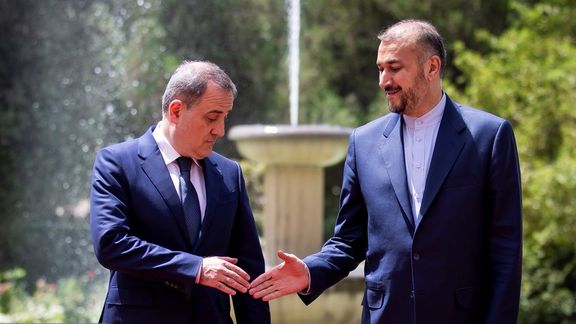
As tensions simmer between Iran and Azerbaijan, Baku has closed the Islamic Republic’s cultural attaché office in the city.
Iran’s IRNA news agency cited an unnamed official as saying that the closure of the cultural advisor’s office is due to the “recent disagreements”between the two countries.
"The Islamic Republic of Iran owns many properties in Baku, and the recent actions are one-sided and hasty excuses by the Azerbaijani side to take the properties that belong to the government of the Islamic Republic of Iran,” the official said.
Claiming that such differences can be resolved through dialogue, he played down the issue which saw iran’s diplomat sent back to Tehran and said the move was “irrational” and “emotional”.
This week, a report, claimed by an opposition group to have been hacked from the Iranian presidency servers, showed that the government is eying ways to redefine its relations with Azerbaijan.
It is the latest incident in a series of tensions which have been rising between Iran and Azerbaijan since November 2022 when both sides accused each other of engaging in terrorism and espionage in the other’s territory.
Iran has suggested Azerbaijani involvement in the October 26 attack in Shiraz claimed by the Islamic State group (Isis-Daesh) and, also accuses Baku of harboring Israeli intelligence and military elements that plan to use its territory in a possible attack against Iran’s nuclear facilities.
The two countries in early May expelled each other’s diplomats after incidents that Baku also dubbed as "terrorist attacks". These included a gunman’s attack on Azerbaijani diplomatic mission in Tehran in January after which Baku shut down the embassy and an attack on Azerbaijani lawmaker Fazil Mustafa in March, who is an outspoken critic of the Islamic Republic.